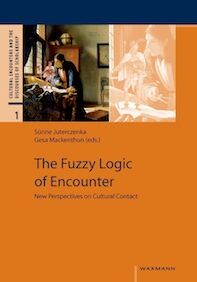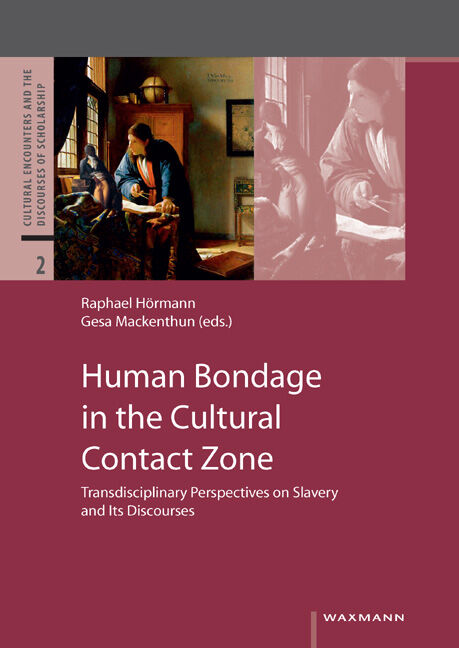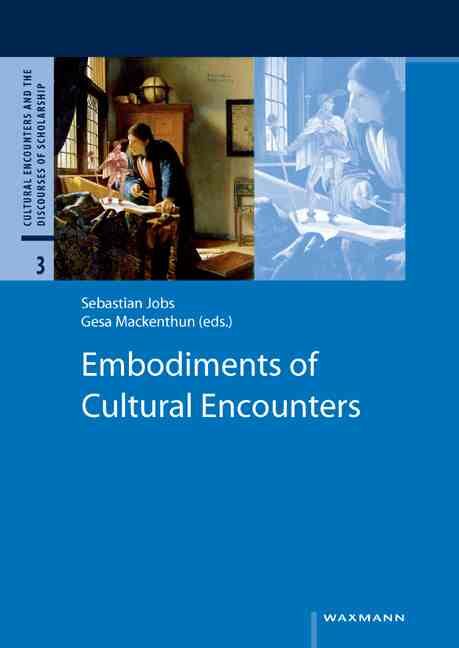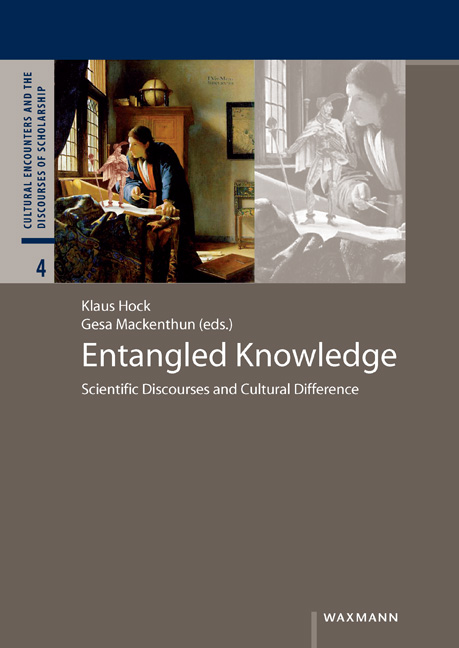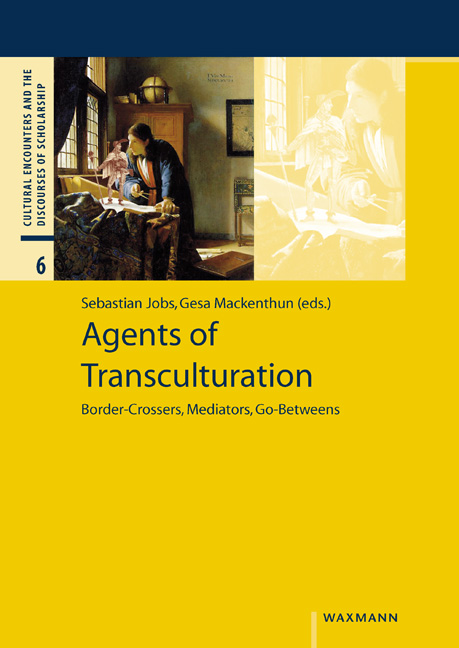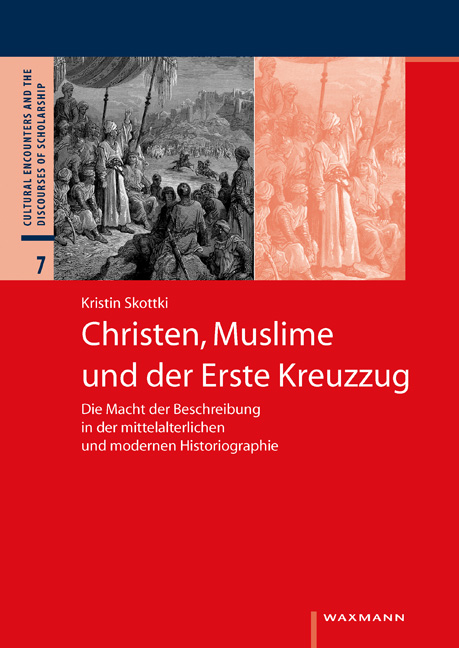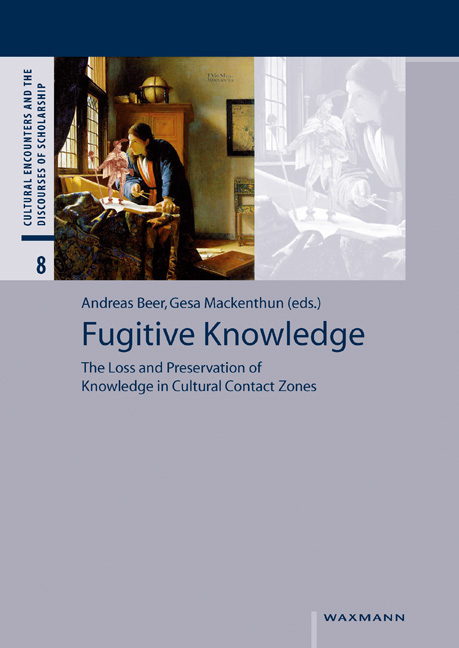Publikationen des Graduiertenkollegs Kulturkontakt und Wissenschaftsdiskurs
In der Reihe "Cultural Encounters and the Discourses of Scholarship" sind bisher erschienen:
Sünne Juterczenka, Gesa Mackenthun (ed.): The Fuzzy Logic of Encounter. New Perspectives on Cultural Contact
(= Cultural Encounters and the Discourses of Scholarship. 1), Münster u. a.: Waxmann, 2009.
How can we describe cultural contact adequately? The Fuzzy Logic of Encounter presents a series of essays reflecting the growing dissatisfaction with dualistic concepts which ignore the complex situations resulting from the European expansion and subsequent historical developments. This intellectual shift is exemplified by a new awareness, in various fields of scholarship, for phenomena of "impurity", such as the use of slightly disharmonious microtones in Indian music, the North American "wampum" (shell beads) as an ambivalent cultural signifier, or archaeological artefacts as embodiments of semantic complexity.
The essays share a common critical concern with the consequences of spatial mobility, cultural amalgamation, and changing cultural affiliations. They seek to introduce a new, positive attitude toward blurred or fuzzy cultural products and boundaries which enables us to take account of entanglement, ambiguity, and mutual impact. The volume includes a variety of disciplinary perspectives ranging from ethnography, historiography, and religious studies to literature, archaeology, and musicology.
Weitere Informationen erhalten Sie auf der Homepage des Waxmann-Verlags.
Raphael Hörmann, Gesa Mackenthun (ed.): Human Bondage in the Cultural Contact Zone. Transdisciplinary Perspectives on Slavery and Its Discourses
(= Cultural Encounters and the Discourses of Scholarship. 2), Münster u. a.: Waxmann, 2010.
Slavery – the subjection of some human beings to a state of bondage by other, more powerful, people – has been an accepted social institution since ancient times. It is less well known that slavery has also produced cultural contact zones in forcing members of different cultures into sharing the same places – whether in private households, on plantations, in mines and quarries, or indeed the same imaginative sites in works of art and public memory. The recent commemorations of the abolition of the transatlantic slave trade by Britain (1807) and the United States (1808), as well as the rise of Black Atlantic Studies as a new academic field, have drawn new attention to this topic. In spite of these recent trends and the prominent position of slavery studies in British and American historiography, slavery’s implications for the study of cultural encounters remain a scholarly desideratum. This volume seeks to contribute to a better understanding of different forms of human bondage in cultural contact zones.
The essays in this collection represent a wide spectrum of the scholarship on slavery, as well as illustrating the vast range of conceptual approaches to the topic. They bring together research from several different disciplines and critical angles addressing, for example, archaeological reconstructions of labor camps in an cient Palestine, the moral significance of early Christian slavery, the ambivalent aestheticization of black bodies within the colonial culture of taste, Enlightenment discourses about black revolution, the significance of mythical narratives in African-American slave culture, the musical mourning for lynching victims, and the blindness toward the presence of slave laborers in Nazi Germany.
Most essays collected here are concerned with the cultural and human aspects of slavery as well as with establishing an understanding for the stark differences between various forms of slavery throughout history, stretching from antiquity into the twentieth century.
Weitere Informationen erhalten Sie auf der Homepage des Waxmann-Verlags.
Sebastian Jobs, Gesa Mackenthun (ed.): Embodiments of Cultural Encounters
(= Cultural Encounters and the Discourses of Scholarship. 3), Münster u. a.: Waxmann, 2011.
The meeting of members of different cultures, frequently conceptualized in abstract terms, always involves the meeting of human bodies. This volume brings together contributions by scholars of various disciplines that address physical aspects and effects of cultural encounters in historical and present-day settings. Bodies were and are not only markers of cultural identity and difference, endlessly inscribed and represented as the ‘body politic’ or ‘the exotic other’; as battlegrounds of cross-cultural signification and identification bodies are also potential agents of change. While some essays address the elusiveness of the ‘real’ or material body, forever lost behind a veil of textual and visual representation, others analyze the performative effect of such representations – their function of disciplining colonized bodies and subjects by integrating them into Western systems of cultural signification and scientific classification. Yet, as the volume also shows, formerly colonized people, far from subjecting themselves completely to Western discourses of physical discipline, retain traditional body practices – whether in food culture, religious ritual, or musical performances. Such local reinscriptions escape the grip of Western culture and transform the global semantics of the body.
Weitere Informationen erhalten Sie auf der Homepage des Waxmann-Verlags.
Klaus Hock, Gesa Mackenthun (ed.): Entangled Knowledge. Scientific Discourses and Cultural Difference
(= Cultural Encounters and the Discourses of Scholarship. 4), Münster u. a.: Waxmann, 2012.
The intimate relationship between global European expansion since the early modern period and the concurrent beginnings of the scientific revolution has long been acknowledged. The contributions in this volume approach the entanglement of science and cultural encounters – many of them in colonial settings – from a variety of perspectives. Historical and historiographical survey essays sketch a transcultural history of knowledge and conduct a critical dialogue between the recent academic fields of Postcolonial Studies and Science & Empire Studies; a series of case studies explores the topos of Europe’s ‘great inventions’, the scientific exploitation of culturally unfamiliar people and objects, the representation of indigenous cultures in discourses of geographical exploration, as well as non-European scientific practices. ‘Entangled Knowledges’ also refers to the critical practices of scholarship: various essays investigate scholarship’s own failures in self-reflexivity, arising from an uncritical appropriation of cultural stereotypes and colonial myths, of which the discourse of Orientalism in historiography and residual racialist assumptions in modern genetics serve as examples. The volume thus contributes to the study of cultural and colonial relations as well as to the history of science and scholarship.
Weitere Informationen erhalten Sie auf der Homepage des Waxmann-Verlags.
Sebastian Jobs, Gesa Mackenthun (ed.): Agents of Transculturation. Border-Crossers, Mediators, Go-Betweens
(= Cultural Encounters and the Discourses of Scholarship. 6), Münster u.a.: Waxmann, 2013.
Ever since antiquity, but increasingly since the global transformation of the world order in the early modern period, communication between members of different cultural groups depended on translators, diplomats, traders, and other specialists with a knowledge of both cultures. Successful communication and traffic relied on the mediating agency of persons who had been exposed, often in their childhood or through captivities, to the customs and languages of both cultures involved in the contact. Other border crossers and go-betweens acted as missionaries, traders, political refugees, beachcombers, pirates, anthropologists, actors in zoos, runaway slaves, and itinerant doctors. Because of their frequently precarious lives, the written traces left by these figures are often thin. While some of their lives have to be carefully reconstructed through critical readings of the documents left by others (frequently by their enemies), others have left autobiographical texts which allow for a richer assessment of their function as cultural border crossers and mediators.
With examples covering from various historical periods between the early modern period and the present, as well as geographical areas such as the Mediterranean, Africa, the Americas, Hawaii, New Zealand and northern Europe, scholars from various disciplines and methodological backgrounds – reaching from history to religious studies and from literary studies to ethnology – fathom the intricacies of in-betweeness and reflect on the impact which "agents of transculturation" have in situations of cultural, social and political encounters.
Weitere Informationen erhalten Sie auf der Homepage des Waxmann-Verlags.
Kristin Skottki: Christen, Muslime und der Erste Kreuzzug. Die Macht der Beschreibung in der mittelalterlichen und modernen Historiographie
(= Cultural Encounters and the Discourses of Scholarship. 7), Münster u.a.: Waxmann, 2015.
Kaum ein Ereignis der mittelalterlichen Geschichte hat so widersprüchliche Beurteilungen erfahren wie die Kreuzzüge. Für manche symbolisieren sie den „Kampf der Kulturen“ zwischen Islam und Abendland. Andere finden in ihnen Beispiele für friedliche Kulturkontakte zwischen Christen und Muslimen. Kristin Skottki rekonstruiert die Entstehungszusammenhänge dieser unterschiedlichen Interpretationen und reflektiert dabei die Bedingungen historischer Forschung im Spannungsfeld von Orientalismus, Okzidentalismus und Mediävalismus. Zugleich bietet sie eine narratologische Analyse der Darstellungen von Begegnungen zwischen Kreuzfahrern und Muslimen in mittelalterlichen Chroniken des Ersten Kreuzzugs. Auf diese Weise wird nicht nur der Frage nach Konstruktionsprozessen von Identitäten und Alteritäten nachgegangen, sondern auch der nach einem ethisch verantworteten Umgang mit schwierigen Texten der mittelalterlichen Vergangenheit.
Hardly any other medieval event has been judged so contradictorily as the Crusades. For some they denote a “Clash of Civilizations” between Islam and the West. Others seek out examples of peaceful cultural encounters between Christians and Muslims in the time of the Crusades. Kristin Skottki traces the contextual origins of these different interpretations and assesses the assumptions of historical research between the priorities of Orientalism, Occidentalism and Medievalism. At the same time she offers a narratological study of textual representations of encounters between Crusaders and Muslims in medieval chronicles of the First Crusade. Thus, not only does this study address the construction of identities and alterities, but also how to ethically engage with difficult texts from the medieval past.
Kristin Skottki (*1981) ist Wissenschaftliche Mitarbeiterin am Lehrstuhl für Kirchengeschichte an der Universität Rostock. Nach Abschluss ihres Studiums der Geschichtswissenschaft und der Theologie/Religious Studies war sie von 2006 bis 2009 Stipendiatin des DFG-Graduiertenkollegs >Kulturkontakt und Wissenschaftsdiskurs< an der Universität Rostock. 2011 wurde sie mit dieser Untersuchung an der Theologischen Fakultät Rostock promoviert.
Kristin Skottki (*1981) is Assistant Professor at the Department of Church History at Rostock University (Germany). After she received the Master of Arts (M.A.) in History and Theology/Religious Studies, she was a PhD-candidate and fellow of the graduate school >Cultural Encounters and the Discourses of Scholarship< at Rostock University from 2006 until 2009. In 2011 she received the doctoral degree in the Science of Religion (Doctor rerum religionum) with the present study.
Weitere Informationen erhalten Sie auf der Homepage des Waxmann-Verlags.
Andreas Beer, Gesa Mackenthun (ed.): Fugitive Knowledge. The Loss and Preservation of Knowledge in Cultural Contact Zones
(= Cultural Encounters and the Discourses of Scholarship. 8), Münster u.a.: Waxmann, 2015.
Encounters between cultures are also encounters between knowledge systems. This volume brings together a number of case studies that explore how some knowledge in cultural contact zones becomes transient, evanescent, and ephemeral. The essays examine various aspects of cultural, especially colonial, epistemic exchanges, placing special emphasis on the fate of those knowledges that are not easily appropriated by or translated from one cultural sphere into another and thus remain at the margins of cross-cultural exchanges. In addition, the imposition of colonial power is unthinkable without the strategic deployment and use of knowledge; most colonial states, including those of Germany in the Baltic and in West Africa, were knowledge-acquiring machines – yet, acquisition always includes rejection, detainment and subjugation of recalcitrant epistemes.
Bringing together insights from various scholarly disciplines, including literary studies, history, historical anthropology, and political science, the essays in this volume investigate how different or unfamiliar knowledge was, and in some cases still is, disarticulated by being belittled, discredited, and demonized. But they also show the strategies of resilience deployed by subjugated and subaltern people: the ways in which certain materials have escaped the coloniality of knowledge – how fragments and shards of other epistemologies remain inscribed in the polyphony and fuzziness of intercultural documents and archives.
Weitere Informationen erhalten Sie auf der Homepage des Waxmann-Verlags.

